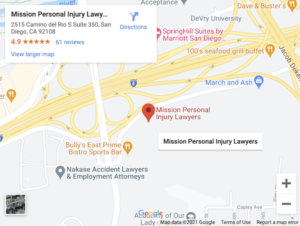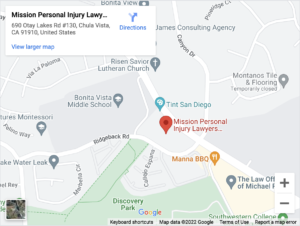
The insurance company for the other party tells you that your personal injury claim is worth a specific amount. Then, they make a settlement offer, which sounds like a lot of money. However, how do you know how much your personal injury case is worth?
The best way to determine how much your claim is worth is to talk to a San Diego personal injury lawyer. Most attorneys offer a free consultation, so it does not cost you anything to speak with them regarding your claim. A lawyer has your best interest at heart, while the insurance company wants to pay as little as possible to make your insurance claim disappear.
Table of Contents
What Compensation Can You Receive in a Personal Injury Case?

The first step is to address what types of damages you can seek in a personal injury claim. You might be unfamiliar with the damages that can be included in a claim.
Economic Damages
Most people know they can receive reimbursement for economic damages. Those damages include the financial losses you incur because of the accident and your injury. However, they focus on medical bills and lost wages.
Unfortunately, the insurance adjuster will not tell you that you can receive reimbursement for other out-of-pocket expenses, including:
- In-home nursing care
- Physical therapy
- Counseling and mental health therapy
- Personal care for help with dressing, feeding, bathing, etc.
- Help with household chores
- Travel expenses to and from medical appointments
- Prescription drugs, over-the-counter medications, and medical supplies
If you sustain a personal injury, you could also be entitled to compensation for future lost wages, long-term care, and diminished earning potential. Your legal team will work with medical specialists to determine the extent of your impairment. They’ll also work with financial experts to accurately calculate the value of future damages.
Call a personal injury lawyer immediately if an insurance adjuster pressures you to settle your claim before you complete medical treatment. A settlement agreement releases all parties from any further liability for your damages. In other words, you would likely receive far less than your claim is worth if you settle the claim too quickly.
Non-Economic Damages
You might not be aware that you can receive compensation for the pain and suffering caused by an accident or personal injury.
You can recover compensation for your:
- Physical pain
- Scarring and disfigurement
- Emotional distress and trauma
- Impairments and disabilities
- Mental anguish
- Loss of enjoyment of life and quality of life
Unfortunately, putting a price on pain and suffering is challenging. As a result, insurance companies routinely undervalue non-economic damages. However, experienced lawyers understand how to calculate the correct value for these damages.
Punitive Damages
Not many personal injury cases qualify for punitive damages. You must file a lawsuit and take the case to court for a jury to award these damages.
Punitive damages do not compensate you for losses. Instead, a jury awards these damages as punishment for a defendant’s conduct. To receive punitive damages, you have the burden of proving the defendant’s conduct met all legal requirements to justify the award.
What Factors Determine How Much My Personal Injury Claim Is Worth?
Even if you know what your damages are and how much they are worth, other factors can impact how much money you receive for your claim.
Factors that impact the value of a personal injury claim include:
- The type and severity of your injuries
- The duration of your recovery
- Whether you sustained a permanent impairment
- The strength of your evidence proving fault and liability
- The parties involved in the case
- The availability of insurance coverage
- Whether you can return to work
- Your appearance before and after the injury
- How the injury impacts your daily life
- Your current age and your health before the accident
Generally, an injury claim’s value increases as the severity of the injuries increases. However, that does not mean you will receive the entire value of the claim.
For example, if the at-fault party does not have sufficient insurance coverage to pay the full value of damages, you would need to file a lawsuit seeking a personal judgment. However, that does not guarantee payment.
Your lawyer will pursue all forms of compensation. So, for instance, if there is insufficient liability insurance to pay a car accident claim, they could file a claim with your insurance company for an underinsured motorist claim if you have that type of car insurance coverage.
Your lawyer will also aggressively fight defenses that could lower the value of your claim. Those defenses include the following:
Comparative Fault
The insurance adjuster might blame you for the accident. Shifting some of the blame to the accident victim can reduce how much money the injured party can receive for their damages.
Contributory fault assigns damages based on liability for the cause of the injury. For example, if the other party is 65% at fault for the cause of a car accident, they are responsible for 65% of the damages the car crash causes.
Therefore, if the insurance company proves you contributed to the cause of your injury, your compensation is reduced by your percentage of fault. For example, if a jury finds you were 20% at fault, you receive 80% of your damages.
Contributory fault is a common tactic used by insurance companies to decrease the value of a personal injury claim. Therefore, never admit fault after an accident. It is best to allow a personal injury lawyer to handle all communications with the insurance company to avoid saying something that could be intentionally misinterpreted to claim that you admitted fault.
Failure to Mitigate Damages
An injury victim has a duty to take reasonable steps to prevent damages from being worse than necessary. Insurance companies often point to delays in seeking medical care or failure to follow a doctor’s instructions as evidence of failure to mitigate damages. The insurance company might argue that you would have recovered sooner and not had as many financial losses if you had seen a doctor sooner.
It is always best to seek prompt medical treatment after an accident or injury. Report all symptoms to your physician immediately. If you disagree with your doctor, seek a second opinion as soon as possible.
Schedule a Free Consultation With Our San Diego Personal Injury Lawyers To Discuss What Your Case May Be Worth
The California statute of limitations sets deadlines for filing personal injury claims. You could lose the right to pursue a legal claim if you wait too long to seek legal advice.
Your personal injury case could be worth more than you realize. Contact our law firm to schedule a free case evaluation with one of our experienced San Diego personal injury attorneys. We’ll fight to get you the money you deserve after an accident or other personal injury. Call Mission Personal Injury Lawyers today at (619) 777-5555.


